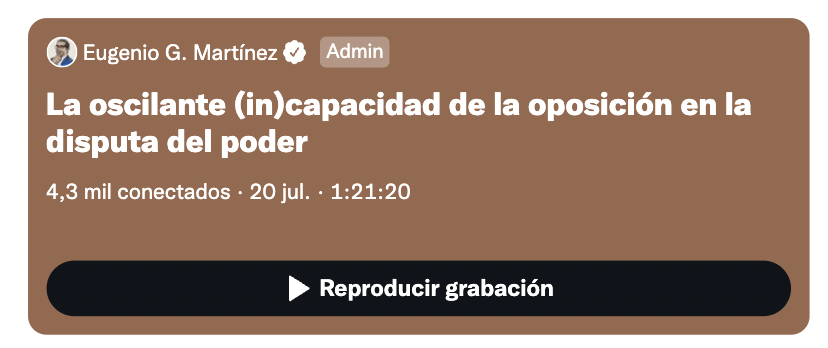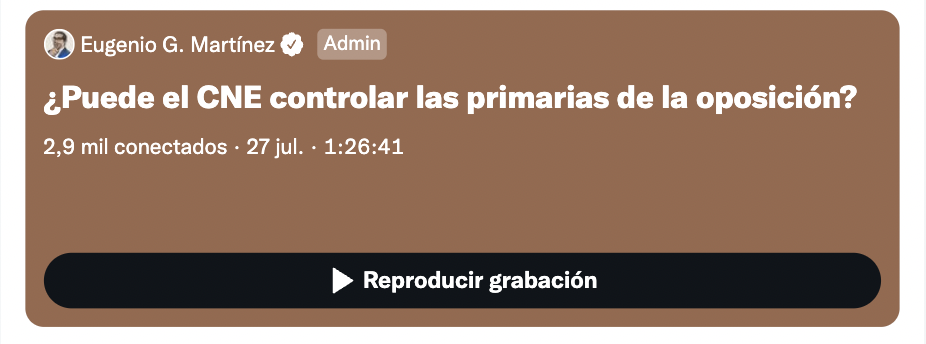| After the invalidation by the Supreme Court of Justice’s Electoral Chamber of all acts to elect the governor of Barinas state and the order that the National Electoral Council (CNE) hold new elections for January 9, 2022, the analysis of the results of the November 21 municipal and regional elections significantly changed. Although the elections in Barinas were held on November 21, not until November 29, the CNE completed vote tallying. The delay of the vote count was a result of the hijacking of three election returns (representing one thousand registered voters), which were under the control of military officers. A week after the vote tallying process for governor in Barinas was halted -due to the military’s refusal to submit the election returns- the CNE declared that the candidate representing the Democratic Unity Roundtable Freddy Superlano won 37.60% of the total votes cast, while the chavista current governor and candidate Argenis Chávez won 37.21%. However, before the proclamation of Superlano, the Electoral Chamber of the Supreme Court of Justice ruled the invalidation of all election acts, based on allegations that Freddy Superlano is disqualified from holding public office by the Office of the Comptroller General. This decision came because the CNE records did not reflect -until November 29- this administrative disqualification. Otherwise, the automated nomination system would have blocked the registration of Superlano as candidate to hold office elected by popular vote. The ruling of the Supreme Court of Justice’s Electoral Chamber (controlled by the political group aligned with Diosdado Cabello and Francisco Ameliach), including Cabello and Maduro’s threats to the members of the EU Electoral Observation Mission, negates the little progress on the electoral guarantees achieved until November 21. At this time, it is unclear why Maduro would sacrifice this meagre progress toward election and his recognition for barring an opposition candidate from holding office, manipulating the election in Barinas state. Beyond its symbolic meaning for being the birthplace of Hugo Chávez, its strategic importance for sharing a border with Colombia, and being a territory controlled by paramilitary groups, costs seem to outweigh benefits. It is also a strategic dilemma for the Venezuelan opposition, which is further divided after the Supreme Court of Justice’s decision The new election scheduled for January 9 will be held with the same voter registration, with no changes in regional electoral officials nor in the military officials that controlled the election returns. Will the opposition contest again in these elections? An assertive answer to this question might be key to the opposition and the country. Chavistas and their worst electoral performance Chavistas’ voter mobilization shows a slow and steady decline. This decline has become more evident after the regional elections held in 2017. In the case of the local, presidential and parliamentary elections, it was supposed that this decline was partly due to the absence of voter competitors requiring a widespread deployment of an electoral mechanism. However, on November 21, chavistas’ electoral deployment exposed the impairment of the official mechanism. This minimum voting point changed significantly the official narrative which days ahead of the elections stressed chavistas’ chances to win an eventual presidential election. |

| Opposition recovers part of its core constituency The results of the November 21 elections show that the PSUV won less than 50% of the votes cast in 17 states. The opposition just won 4 of these votes cast (including the Barinas state) and maintained the dispute until the last minute in Apure. This trend suggests that increased opposition voter turnout with political unity would have reported one of the best numerical performances of the opposition in this type of election. However, the opposition vote against Maduro is spread among several ballot cards and coalitions. So far, any existence of a political unity among these several coalitions seems unfeasible. |

The unity between the MUD coalitions and most of the parties that make up the Democratic Alliance (parties intervened by the Supreme Court of Justice such as Democratic Action) is unfeasible at this moment. A political-electoral unity between the MUD and the Neighborhood Force (Fuerza Vecinal) is more possible. However, it is not free of challenges (as the case in Miranda state).
Voter

| Voter turnout analysis must be addressed and discussed in a way that goes beyond the argument that “few people voted”. Also, future political decision-making requires a recalculation of Registered Voters. The needed recalculation of Registered Voters is even greater when the opposition has failed to move forward to achieve the participation of most Venezuelans abroad in an eventual presidential election or a recall referendum. If it is found that 4 million voters are registered in Venezuela, but are abroad, the Voter Registration must account for 17 million voters registered (not 21 million). If Registered Voters are recalculated, then voter turnout was over 51%. An analysis from this view would change significantly some conclusions, especially in the recovery of the willingness to take part in election events after the significant decline of this indicator between 2017 and 2020. |

| However, the official result of voter turnout is 41.8% (when including the abstention in the 4 million voters registered to vote in Venezuela but are abroad). Excluding the recalculation of Registered Voters, voter turnout in the November 21 elections recorded one of the lowest levels for this type of event, just compared to the elections to relegitimize regional offices held in 2000. |






